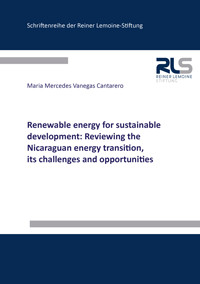
Shop : Details
Shop
Details
48,80 €ISBN 978-3-8440-8081-0Softcover158 pages27 figures233 g21 x 14,8 cmEnglishThesis
June 2021
Maria Mercedes Vanegas Cantarero
Renewable energy for sustainable development: Reviewing the Nicaraguan energy transition, its challenges and opportunities
Energy is fundamental for development. Renewable energy has been appointed among the primary strategies to tackle the current climate crisis and build more resilient and sustainable energy systems. Developing and emerging economies have been leading investments in renewable energy. Due to the modest size of most of these economies, transitioning to sustainable and renewable energy systems could be a swift and less resource-intensive process, once adequate strategies and policies are in place.
Nicaragua actively invested in renewable energy capacity in the last decade, positioning itself among the early leaders of the energy transition in Latin America. With a vast renewable energy potential, produces more than 50% of its electricity from renewable energy sources. Furthermore, using the distributed nature of renewable energy sources to its advantage, the country provided access to modern energy to nearly 99% of its population in 2020, a significant increase from 54% in 2006.
Renewable energy is playing an important role in dissociating economic development from environmental degradation. The next steps for Nicaragua's transition should involve both a cross-sectoral and decentralized approach to energy planning. Thereby, renewable energy can be integrated into highly oil-dependent economic sectors such as transport and industry. The country should adopt technologies to increase the uptake of renewable energy and leapfrog the resource-intensive development path followed by it adopt technologies to increase the uptake of renewable energy and leapfrog the resource-intensive development path followed by its forerunners. This thesis provides a roadmap to accelerate the energy transition in the country that is applicable to other nations in the Global South.
Nicaragua actively invested in renewable energy capacity in the last decade, positioning itself among the early leaders of the energy transition in Latin America. With a vast renewable energy potential, produces more than 50% of its electricity from renewable energy sources. Furthermore, using the distributed nature of renewable energy sources to its advantage, the country provided access to modern energy to nearly 99% of its population in 2020, a significant increase from 54% in 2006.
Renewable energy is playing an important role in dissociating economic development from environmental degradation. The next steps for Nicaragua's transition should involve both a cross-sectoral and decentralized approach to energy planning. Thereby, renewable energy can be integrated into highly oil-dependent economic sectors such as transport and industry. The country should adopt technologies to increase the uptake of renewable energy and leapfrog the resource-intensive development path followed by it adopt technologies to increase the uptake of renewable energy and leapfrog the resource-intensive development path followed by its forerunners. This thesis provides a roadmap to accelerate the energy transition in the country that is applicable to other nations in the Global South.
Keywords: Nicaragua; Renewable energy; Smart energy system; Energy justice; Energy democracy; Sustainable development
Schriftenreihe der Reiner Lemoine-Stiftung
Edited by Reiner Lemoine-Stiftung, Neuss
Available online documents for this title
DOI 10.2370/9783844080810
You need Adobe Reader, to view these files. Here you will find a little help and information for downloading the PDF files.
Please note that the online documents cannot be printed or edited.
Please also see further information at: Help and Information.
Please also see further information at: Help and Information.
| Document |  | Document | ||
| Type |  | |||
| Costs |  | 36,60 € | ||
| Action |  | Purchase in obligation and download the file | ||
| Document |  | Table of contents | ||
| Type |  | |||
| Costs |  | free | ||
| Action |  | Download the file | ||
User settings for registered online customers (online documents)
You can change your address details here and access documents you have already ordered.
User
Not logged in
Export of bibliographic data
Shaker Verlag GmbH
Am Langen Graben 15a
52353 Düren
Germany
Am Langen Graben 15a
52353 Düren
Germany
Mon. - Thurs. 8:00 a.m. to 4:00 p.m.
Fri. 8:00 a.m. to 3:00 p.m.
Fri. 8:00 a.m. to 3:00 p.m.
Contact us. We will be happy to help you.



